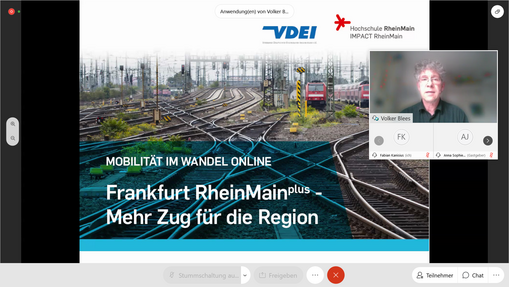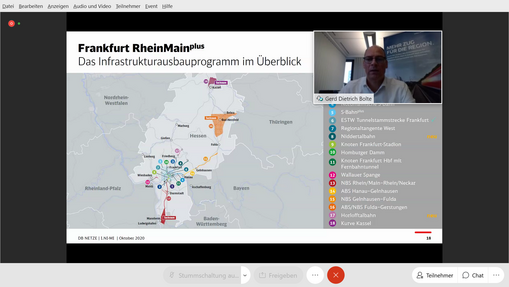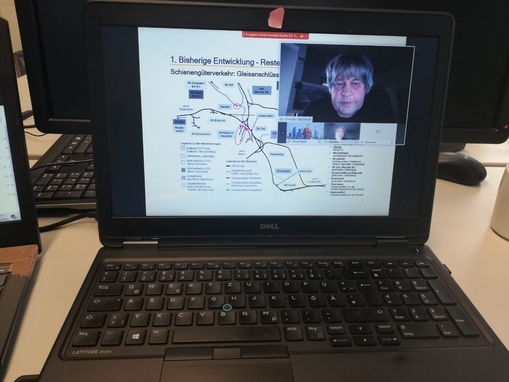Frankfurt RheinMainplus - More traction for the region
The seventh event of IMPACT RheinMain’s “Mobilität im Wandel” series was held last Wednesday, October 21, 2020, under the motto “Frankfurt RheinMainplus - More traction for the region”. Volker Blees, Professor of Transportation at RheinMain University of Applied Sciences, welcomed the more than 60 participants of the online event and the high-profile discussion panel. Dr. Thomas Mainka, President of the Verband Deutscher Eisenbahn-Ingenieure (VDEI) (Association of German Railway Engineers), opened the event with a presentation on the VDEI. He emphasized the role of the association as a representative of the interests of engineers and welcomed the high proportion of lateral entrants in the rail sector. The VDEI's fundamental objective, according to Dr. Mainka, is to promote both greater use of rail transport and interest in engineering professions.
Rhine-Main: a metropolitan region with an exciting future
The first speaker was Gerd-Dietrich Bolte, Head of Großprojekte Mitte (large-scale projects central Germany) at DB Netz AG, who presented various projects for new rail construction and expansion in the Rhine-Main region planned for the coming years. The main reason for the need for additional rail capacity in the Rhine-Main region, he said, is the high level of commuter traffic around Frankfurt as the “commuter capital of Germany”. Further track construction is urgently needed here, said Bolte, as the capacity limit has been reached and the existing transport infrastructure can no longer accommodate the increased demand.
This can be seen, for example, in the daily rush-hour traffic jams around Frankfurt. The region would particularly benefit from suburban trains able to transport significantly more people, and the available services and infrastructure of the suburban train network would therefore have to be expanded. In contrast to an increase in the construction of roads for car traffic, the necessary amount of land usage would be significantly lower, and the environment would be far less impacted as a result. Major investment in the rail network on a supra-regional level is also necessary, he explained, as around 80 percent of all long-distance trains operated by Deutsche Bahn pass through Hesse and the Rhine-Main region is therefore regarded as the "center of Germany".
The Frankfurt long-distance rail tunnel: A large-scale project
Gerd-Dietrich Bolte then reported on two Deutsche Bahn projects designed to equip the region’s railway network for current and future demand. These include, for example, the new line Wallauer Spange, designed to reduce travel times between Wiesbaden and Frankfurt Airport as well as between Frankfurt Central Station and Darmstadt. Another major project, which Mr. Bolte presented as “the most interesting project of modern times” and which is to be realized in the coming years, is the construction of the Frankfurt long-distance rail tunnel. This is intended to create additional capacity at Frankfurt Central Station, in order to be able to deal with the increase in long-distance trains, suburban trains and subway trains. To this end, an underground double-track long-distance rail tunnel with an underground station is to be built, which would enable more conflict free routing of long-distance trains and would also reduce travel times. Initial findings from a feasibility study are to be available by 2021.
Network development from a municipal perspective
The second speaker, Christian Behrendt from Wiesbaden’s municipal department Umwelt, Grünflächen und Verkehr (Environment, Green Spaces and Transport), reported on network development from a municipal perspective. He emphasized that, in addition to maintaining existing infrastructure, it is also important to expand the network in order to create additional capacity and, for example, to ensure that public transportation is accessible for passengers with disabilities. In addition to the efforts of Wiesbaden itself, he explained, it is also important for the city to be better connected to long-distance rail services – for example, by improving the “Deutschlandtakt” service (a synchronized timetable for all of Germany’s passenger rail transport). And for supra-regional routes, such as the connection between the Rheingau region and the state capital or Frankfurt Airport, Wiesbaden is also dependent on cooperation with Deutsche Bahn and would welcome better communication and planning processes.
The event was recorded and can be viewed on the University’s YouTube channel.


